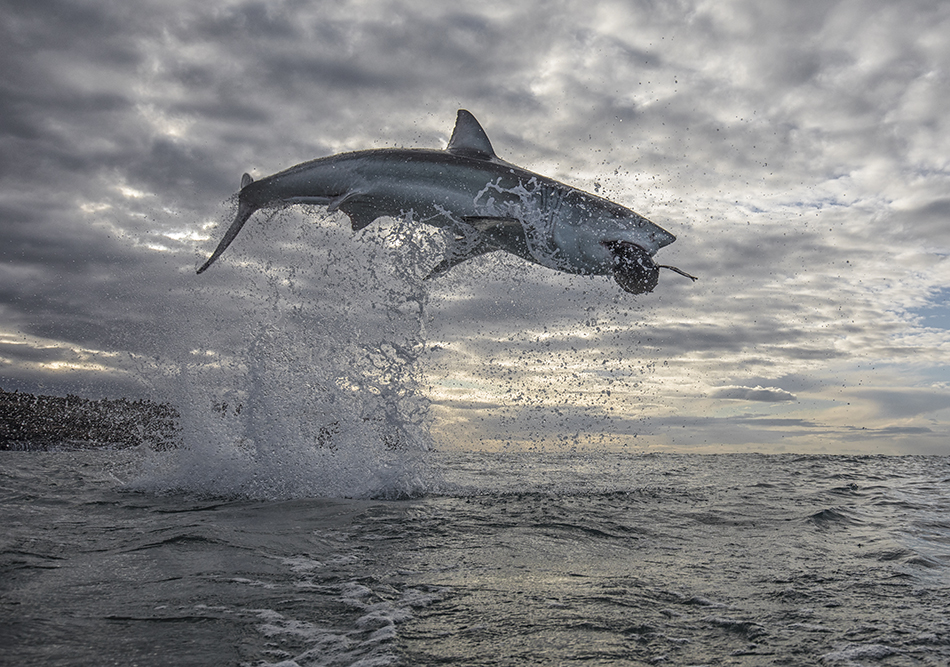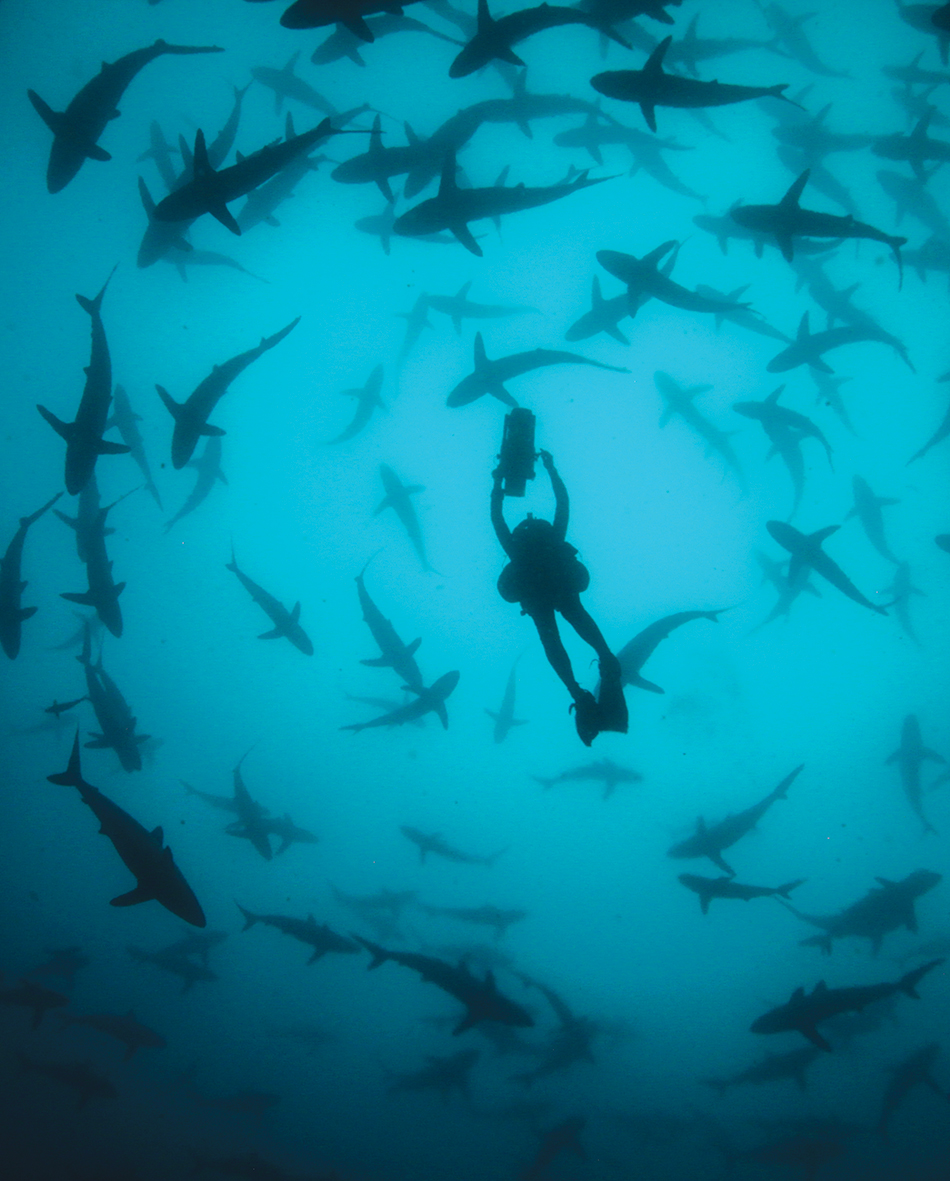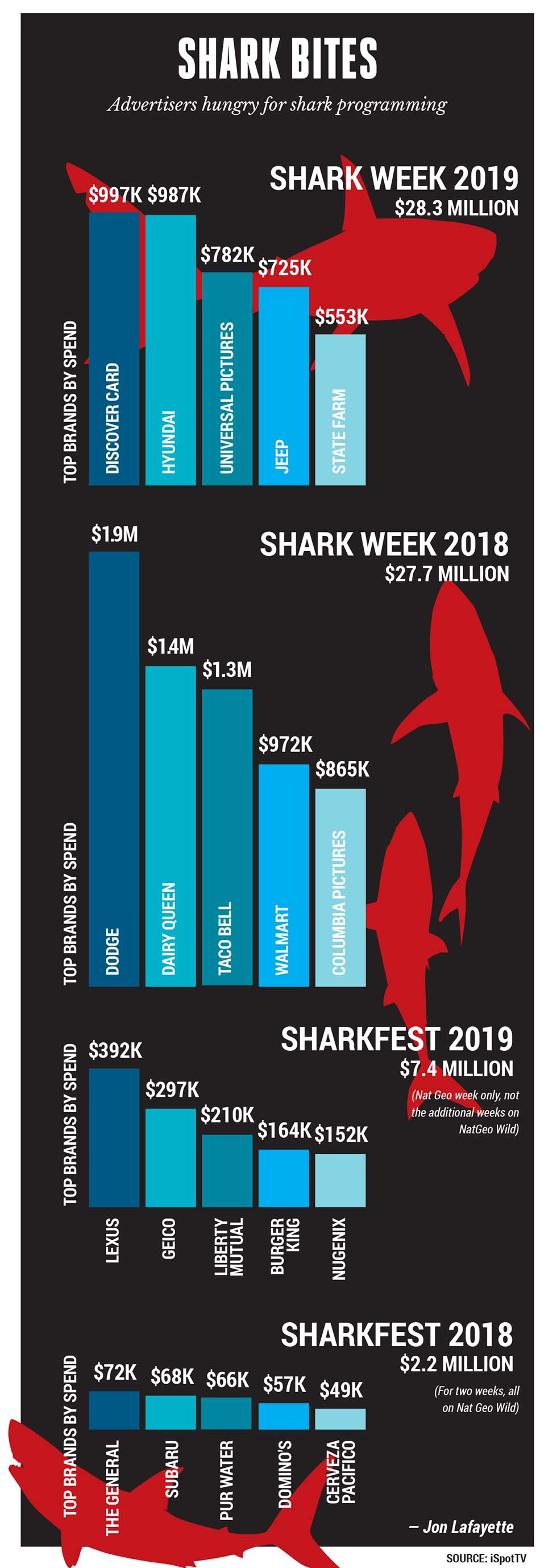Cover Story: Summer of Sharks
The smarter way to stay on top of the multichannel video marketplace. Sign up below.
You are now subscribed
Your newsletter sign-up was successful
It is a summer like no other for the various networks offering shark-centric stunts. Sharks around the world have had more freedom to roam with so many humans stuck at home, offering scientists a unique opportunity to chronicle their true behavior. Discovery, home of Shark Week, mentioned how fewer people hanging out at the beach “has given sharks the opportunity to reclaim the oceans.”
Shark Week runs Aug. 9 to Aug. 16, and vows to go where none of the 31 Shark Weeks before it have gone. “It’s a really unique, almost once in a lifetime opportunity to study great whites in a way they’ve never been observed before, without the influence of human activity on the water,” Howard Swartz, Discovery senior VP of production and development, said. “There are really surprising observations, surprising results.”

National Geographic, for its part, expanded its SharkFest event from three weeks last year to five weeks, going from July 19 to Aug. 8 on Nat Geo and Aug. 9 to Aug. 22 on Nat Geo Wild. Geoff Daniels, Nat Geo executive VP of global unscripted entertainment, said the absence of the Olympics and most pro sports on television spelled serious opportunity for other content, including shark stuff. “The appetite is almost insatiable,” he said. “We saw there being a real good opportunity to expand and grow our following.”
RELATED: Nets Strutting Out Stunts This Summer
While conditions may be ideal this year for shark TV on the content side, there are good reasons why Discovery has been doing Shark Week since 1988 and why other networks have followed that lead: viewers tune in and sponsors turn up. Shark Week averaged , for one,1.36 million total viewers during prime last year and made Discovery cable's top non-news network in prime for adults 18-34, 18-49 and 25-54. In total-day ratings, Discovery was cable’s No. 1 network during Shark Week in adults 18-49 and 25-54.
Fintastic Fare
In terms of pandemic-themed programming, Shark Week offers Shark Lockdown, about how the hunting patterns of great whites off New Zealand may have changed without many people in the water, Aug. 9. Sharks of Neptune is on Aug. 13, looking at how great whites in Australia “are returning to their natural behaviors” without mankind getting in the way.
The smarter way to stay on top of the multichannel video marketplace. Sign up below.

Shark Week also offers new Air Jaws films dedicated to great whites leaping out of the water. Those include Ultimate Breach Off, an examination of how the shark population is holding up (that kicks off Shark Week Aug. 9) and Air Jaws 2020, which celebrates 20 years of flying sharks under the Air Jaws rubric, and is on Aug. 13. Great White Double Trouble looks at the rising wave of shark attacks in Australia, and premieres Aug. 10.
Mike Tyson, Will Smith, Shaquille O’Neal and Snoop Dogg are some of the celebrities hanging out with the apex predators during Shark Week.
In its eighth season, Nat Geo’s SharkFest offers 17 premiere hours, including Sharkcano, which sees a shark scientist reveal the peculiar connection between sharks and volcanos; and Raging Bull Shark, about why the bull shark is becoming increasingly dangerous. There’s also Sharks vs. Dolphins, which sounds like a bit of a mismatch on paper, but actually is not, according to Kevin Bachar, president and executive producer/director at Pangolin Pictures, which produced the film. Dolphins’ brains, he said, are a pretty good match for sharks’ sharp teeth. “Dolphins are able to go toe-to-toe with sharks,” he said. “In fact, they’re able to turn the tables on sharks.”

SharkFest will not focus on how COVID has affected shark habits — at least not this year. “I think it’s probably too early to really understand the impact the pandemic is having on shark life and shark behavior,” Daniels said. “But it did give us the opportunity to get into oceans that were not as influenced by human presence, an opportunity to see sharks behave completely unaffected by the human presence.”
Daniels said he “wouldn’t be surprised to see that become part of the stories going forward.”
Last year’s SharkFest, which went for three weeks, reached 20 million total viewers across Nat Geo and Nat Geo Wild. It averaged 555,000 total viewers on National Geographic and 215,000 on Nat Geo Wild.
Syfy might not have the nonfiction pedigree of Discovery and Nat Geo, but the network is also pushing hard on a shark stunt. One Last Bite of Summer, marking its fifth year, airs on the network Aug. 22 to Aug. 28. The half-dozen Sharknado films are featured, as for the first time is an array of high-camp original films, produced by Syfy and third-party outfits. The six Sharknado movies — including Sharknado: The 4th Awakens and Sharknado 5: Global Swarming — air Aug. 22. Ian Ziering and Tara Reid play fearless shark killers in the over-the-top horror movies, which offer loads of celebrity cameos.
In press materials, Syfy called One Last Bite “the only week of sharks you need this summer.” The rest of the stunt offers, among other movies, 5-Headed Shark, 6-Headed Shark, Planet of the Sharks, Zombie Tidal Wave and Sharktopus vs. Whalewolf.
RELATED: Sponsors Keep Biting at Discovery's Shark Week
Val Boreland, executive VP, content strategy & acquisitions for the NBCUniversal Entertainment & Lifestyle Group, said the Syfy stunt is most definitely not Shark Week.
“It’s all in fun,” she said. “It’s very campy, the most ridiculous shark experience you
can have.”
Might there be more Sharknado movies? “I never say never,” Boreland said.
While Discovery and Nat Geo shoot their shark projects year-round, the pandemic nonetheless caused a bit of havoc in the production process. Discovery deployed extra boats to better allow crews to socially distance, and protocols were set up to keep the virus at bay. “It added complexity, it added expense, it added time spent putting things together,” Howard Swartz said. “It definitely created some agita, but we were able to be patient and work through it.”
Geoff Daniels said that SharkFest projects may be in production for one and a half to two years, so COVID-19 challenges were less of an issue for Nat Geo. “There are no shortcuts to be able to tell groundbreaking, thrilling, entertaining stories,” he said.
Tooth Seekers
Asked why viewers appear to be so fascinated with sharks, multiple sources cite the 1975 Steven Spielberg smash Jaws. As the wide array of horror films and series across our TV dial will attest, people simply love to be scared to death. “For some reason we gravitate to roller coasters, we go see scary movies,” Bachar said. “We’re fascinated by things that terrorize us.”
Mary Dalton, professor of communication at Wake Forest University, called shark programming “a manageable risk:” it’s scary and it’s fun, and if it gets too scary, one can simply change the channel or leave the room. “There’s the adrenaline rush, and a sense of relief when it’s over,” she said.

Dalton likens the shark stunts on TV this summer to something else that tickled our desire to be frightened: Netflix smash Tiger King. “The lure, and lore, of big cats is not that different from the lure, and lore, of sharks,” she said. “Both are exotic.”
(Also exotic? Tiger King star Joe Exotic.)
Viewers simply enjoy watching a “perfect hunting machine,” in Swartz’s words, in action. “Sharks are massive and have lots of really big teeth. People are fascinated by that.”
As Tiger King took off in the early days of the COVID lockdown, shark content may work even better for a viewing population that has been stuck at home for a good chunk of 2020, spending much of its time watching frightful tales of pandemic and protest on the news. Daniels mentioned feeling “incredibly happy” after watching SharkFest cuts from the South Pacific and the Caribbean. “It offers viewers a really wonderful and hopeful escape from the everyday,” he added.
Discovery’s Swartz suspects increased hunger for shark content this summer. “It’s a nice respite from all the news of the world, and all the realities that are going on,” he said. “People love sharks.”
Michael Malone is content director at B+C and Multichannel News. He joined B+C in 2005 and has covered network programming, including entertainment, news and sports on broadcast, cable and streaming; and local broadcast television, including writing the "Local News Close-Up" market profiles. He also hosted the podcasts "Busted Pilot" and "Series Business." His journalism has also appeared in The New York Times, The L.A. Times, The Boston Globe and New York magazine.

